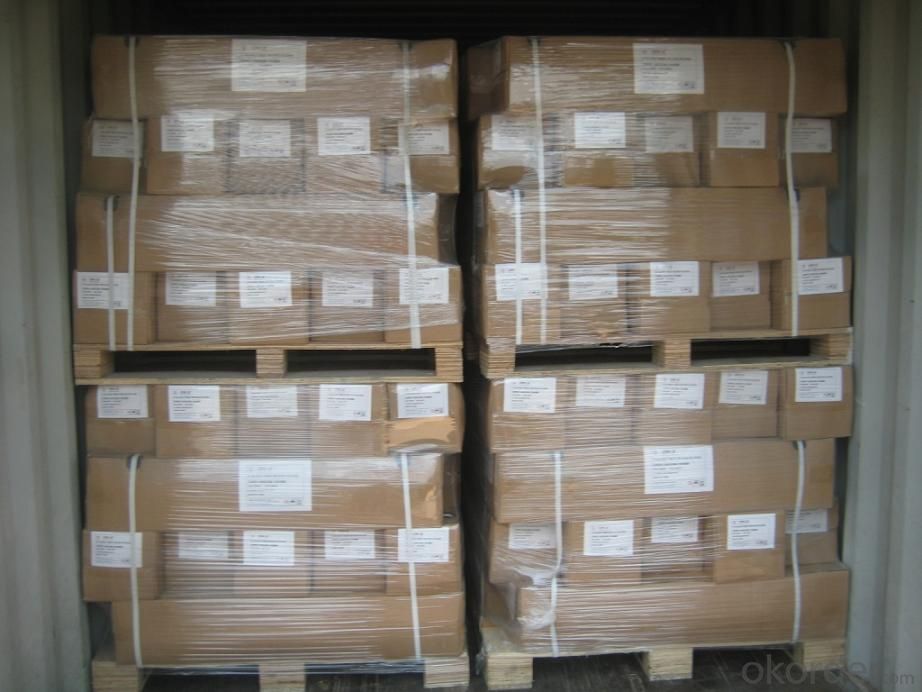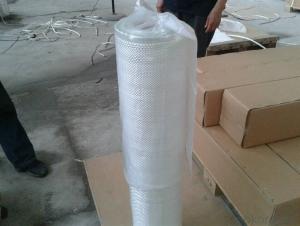C Glass Woven Roving For FRP Application
- Loading Port:
- China Main Port
- Payment Terms:
- TT or LC
- Min Order Qty:
- 17600 m²
- Supply Capability:
- 17600kg Per Month m²/month
OKorder Service Pledge
OKorder Financial Service
You Might Also Like
Product Description
Glass woven rovings are bidirectional fabric made by direct rovings in plain weave pattern.
Compatible with unsaturated polyester,vinylresin ,epoxy resin.
Applicable for hand lay-up, winding and compress molding process,Suitable for manufacturing tank,boat,automobile parts and other FRP products.
Consistent thickness and excellent surface treatment.
Rapid impregnating and good compatibility with resin.
Uniform tension,high dimensional stability and making handing easy.
Good mechanical properties and high strength of parts.

Technical Data Sheet
Style | Yarn(Tex) | Density(ends/10cm) | (g/m2) | Width(cm) | Tensile strength(N/50mm) | ||
Warp | Weft | Warp | Weft | ||||
EWR200 | 200 | 50 | 50 | 200±16 | 90/100 | ≥1300 | ≥1100 |
ERW400 | 600 | 35 | 32 | 400±32 | 100/127 | ≥2500 | ≥2200 |
EWR570 | 1150 | 26 | 24 | 570±45 | 100/127 | ≥3600 | ≥3300 |
EWR600 | 1200 | 26 | 24 | 600±48 | 100/127 | ≥4000 | ≥3850 |
EWR800 | 2400 | 18 | 16 | 800±64 | 100/127 | ≥4600 | ≥4400 |
CWR135 | 150 | 50 | 40 | 135±10 | 90/100 | ≥750 | ≥600 |
CWR180 | 200 | 50 | 50 | 200±16 | 90/100 | ≥1150 | ≥1000 |
CWR290 | 450 | 35 | 30 | 290±22 | 90/100 | ≥1500 | ≥1400 |
CWR310 | 500 | 35 | 28 | 310±24 | 90/100 | ≥1600 | ≥1500 |
CWR330 | 500 | 35 | 31 | 3300±26 | 90/100 | ≥1700 | ≥1600 |
CWR350 | 500 | 35 | 35 | 350±28 | 90/100 | ≥1800 | ≥1700 |
CWR400 | 500 | 40 | 40 | 400±32 | 90/100 | ≥2000 | ≥1900 |
CWR600 | 1200 | 26 | 24 | 600±48 | 100/127 | ≥2750 | ≥2600 |
CWR800 | 2400 | 18 | 16 | 800±61 | 100/127 | ≥3000 | ≥2900 |
FAQ
Package and Storage:Eech roll is packed by polyester bag,and then put into a cardboard box or plastic wowen bag.The weight of each roll is between 20 to 85 Kg, The rolls are to be horizontally placed and could be in bulk or on pallet.Optimum storage conditions are between the temperature of 5~35℃ and with the humidity between 35%~65%.The product should be used within 12 months from the time of delivery and remain in theiroriginal packaging until just prior to use.
- Q:Can fiberglass mat tissue be used for automotive repairs?
- Yes, fiberglass mat tissue can be used for automotive repairs. Fiberglass mat tissue is a versatile material that is commonly used in various industries, including the automotive industry. It is often used for reinforcing and repairing auto body panels, as well as fixing cracks, holes, and other damages in the vehicle's body. Fiberglass mat tissue is made up of fine fibers that are bound together with a resin. This composition gives it excellent strength and flexibility, making it ideal for automotive repairs. It can be easily shaped and molded to fit different contours and shapes of car parts, ensuring a seamless repair. Additionally, fiberglass mat tissue is lightweight and durable, which is crucial for automotive repairs. It provides excellent resistance against corrosion, weathering, and other external elements, ensuring the longevity of the repair. It also offers good impact resistance, protecting the repaired area from further damage. Furthermore, fiberglass mat tissue is compatible with various types of automotive coatings, such as primers, paints, and clear coats. This allows for a smooth and professional finish after the repair is complete. In conclusion, fiberglass mat tissue is a suitable material for automotive repairs due to its strength, flexibility, durability, and compatibility with automotive coatings. It is commonly used in the industry for reinforcing and repairing auto body panels, fixing damages, and ensuring a seamless finish.
- Q:Is fiberglass mat tissue suitable for sound absorption?
- Fiberglass mat tissue is indeed appropriate for sound absorption. Its exceptional acoustic properties make it a highly efficient material for decreasing noise levels and enhancing sound quality in different settings. The fibrous composition of the mat tissue offers a large surface area capable of absorbing sound waves and converting them into heat energy. This renders it an optimal choice for soundproofing walls, ceilings, and floors in buildings, as well as for automotive, industrial, and marine applications. Moreover, fiberglass mat tissue is lightweight, simple to install, and possesses excellent durability and fire resistance, further augmenting its aptness for sound absorption objectives.
- Q:What is the fire rating of fiberglass mat tissue?
- The fire rating of fiberglass mat tissue differs based on its specific composition and the standards it has been tested against. Typically, fiberglass mat tissue is engineered to possess fire-resistant qualities, but the actual fire rating relies on variables like the tissue's thickness and any supplementary fire retardant coatings or treatments. To ascertain the fire rating of a particular fiberglass mat tissue product, it is advisable to refer to the manufacturer's specifications or test reports, as they offer the most precise and current information available.
- Q:Is fiberglass mat tissue fire-resistant?
- No, fiberglass mat tissue is not inherently fire-resistant. While fiberglass itself is a non-combustible material, fiberglass mat tissue is typically combined with a binder or resin that may be flammable. However, specialty fiberglass mat tissue products are available that have been treated with fire-resistant coatings or additives to enhance their fire resistance properties. These treated materials can provide improved fire resistance and are commonly used in applications where fire safety is a concern, such as in certain construction or insulation materials. It is important to review the specific product specifications or consult with the manufacturer to determine the fire resistance capabilities of a particular fiberglass mat tissue.
- Q:What is the flexural strength of fiberglass mat tissue?
- The flexural strength of fiberglass mat tissue refers to its ability to resist bending or flexing without breaking. It is typically high due to the reinforcing properties of the fiberglass material, making it suitable for applications requiring structural integrity and resistance to deformation.
- Q:Is fiberglass mat tissue resistant to fading?
- Yes, fiberglass mat tissue is resistant to fading.
- Q:What are the applications of fiberglass mat tissue?
- Fiberglass mat tissue is a versatile material that finds numerous applications across various industries. Some of the key applications of fiberglass mat tissue are: 1. Construction and Building Materials: Fiberglass mat tissue is widely used in the construction industry as a reinforcement material. It is commonly used in the manufacturing of roofing shingles, insulation materials, and wall coverings. The strong and durable nature of fiberglass mat tissue enhances the structural integrity of buildings and improves their resistance to external elements such as wind, moisture, and temperature changes. 2. Automotive Industry: Fiberglass mat tissue is extensively used in the automotive sector for manufacturing various components such as door panels, headliners, trunk liners, and interior trim parts. The lightweight and high strength properties of fiberglass mat tissue make it an ideal material for reducing the overall weight of vehicles while maintaining their structural integrity. 3. Marine Industry: Fiberglass mat tissue is widely used in the marine industry for the production of boat hulls, decks, and other structural components. The corrosion-resistant nature of fiberglass mat tissue makes it suitable for marine applications where exposure to water and harsh weather conditions is common. 4. Pipe Manufacturing: Fiberglass mat tissue is used in the production of fiberglass reinforced pipes. These pipes find applications in various industries such as oil and gas, chemical, and water management. The high strength and corrosion-resistant properties of fiberglass mat tissue make it an excellent choice for manufacturing pipes that can withstand high pressure and harsh chemical environments. 5. Filtration Systems: Fiberglass mat tissue is used in the production of air filters and liquid filtration systems. The fibrous structure of the material allows for efficient filtration by trapping dust particles, dirt, and other contaminants. This makes fiberglass mat tissue a preferred choice for applications requiring high-efficiency filtration, such as HVAC systems, industrial air filters, and water treatment plants. Overall, the applications of fiberglass mat tissue are vast and diverse, ranging from construction and automotive industries to marine and filtration systems. Its unique properties make it an invaluable material for enhancing structural integrity, reducing weight, and improving performance across various sectors.
- Q:Can fiberglass mat tissue be used for acoustic insulation?
- Yes, fiberglass mat tissue can be used for acoustic insulation. It is a commonly used material for soundproofing due to its ability to absorb and dampen sound waves. Its high density and fibrous structure make it effective in reducing noise and improving acoustic performance in buildings, vehicles, and other applications.
- Q:Can fiberglass mat tissue be used for making lightweight furniture?
- No, fiberglass mat tissue is not typically used for making lightweight furniture. It is primarily used as a reinforcement material in applications such as insulation, automotive parts, and construction, but not for furniture production.
- Q:What is the expected lifespan of fiberglass mat tissue in chemical storage applications?
- The lifespan of fiberglass mat tissue in chemical storage applications can vary depending on several factors. These factors include the type and concentration of chemicals being stored, as well as the specific conditions of the storage environment. Fiberglass mat tissue is widely used in chemical storage applications because it has excellent corrosion resistance and provides structural reinforcement. However, it is important to note that fiberglass mat tissue is not completely immune to chemical degradation. In general, fiberglass mat tissue can withstand a wide range of chemicals and has a relatively long lifespan when properly maintained. It is typically designed to last for several years, and some manufacturers offer warranties ranging from 10 to 20 years. However, aggressive chemicals or extreme storage conditions can accelerate the degradation of fiberglass mat tissue. Chemicals with high acidity or alkalinity, extreme temperatures, or prolonged exposure to UV radiation can potentially reduce the lifespan of the material. To ensure the maximum lifespan of fiberglass mat tissue in chemical storage applications, it is crucial to carefully select the appropriate type of fiberglass mat tissue that is specifically designed for the intended chemicals and storage conditions. Regular inspections, maintenance, and proper handling of the chemicals can also help prolong the lifespan of the material. Ultimately, it is advisable to consult with the manufacturer or a qualified engineer to determine the expected lifespan of fiberglass mat tissue in a specific chemical storage application. They can provide more accurate information based on the specific circumstances.
1. Manufacturer Overview |
|
|---|---|
| Location | |
| Year Established | |
| Annual Output Value | |
| Main Markets | |
| Company Certifications | |
2. Manufacturer Certificates |
|
|---|---|
| a) Certification Name | |
| Range | |
| Reference | |
| Validity Period | |
3. Manufacturer Capability |
|
|---|---|
| a)Trade Capacity | |
| Nearest Port | |
| Export Percentage | |
| No.of Employees in Trade Department | |
| Language Spoken: | |
| b)Factory Information | |
| Factory Size: | |
| No. of Production Lines | |
| Contract Manufacturing | |
| Product Price Range | |
Send your message to us
C Glass Woven Roving For FRP Application
- Loading Port:
- China Main Port
- Payment Terms:
- TT or LC
- Min Order Qty:
- 17600 m²
- Supply Capability:
- 17600kg Per Month m²/month
OKorder Service Pledge
OKorder Financial Service
Similar products
New products
Hot products
Related keywords




























